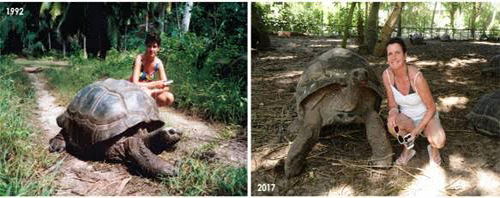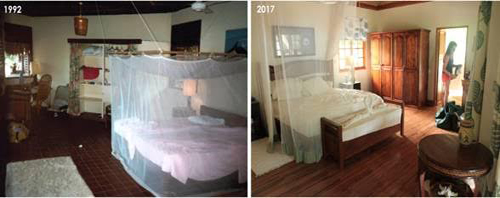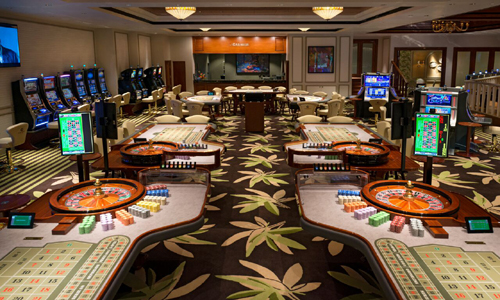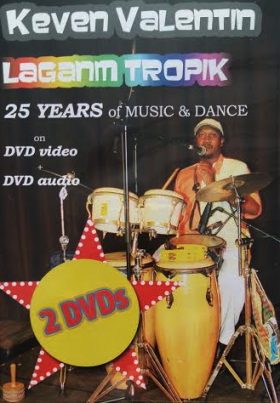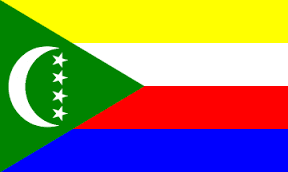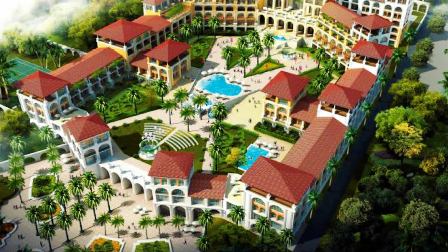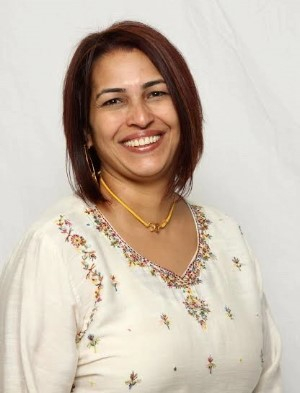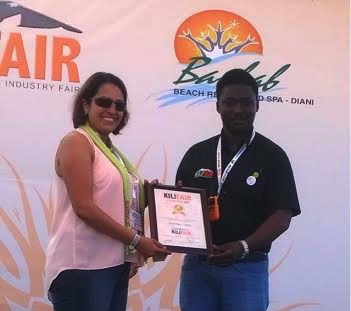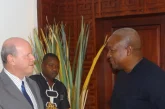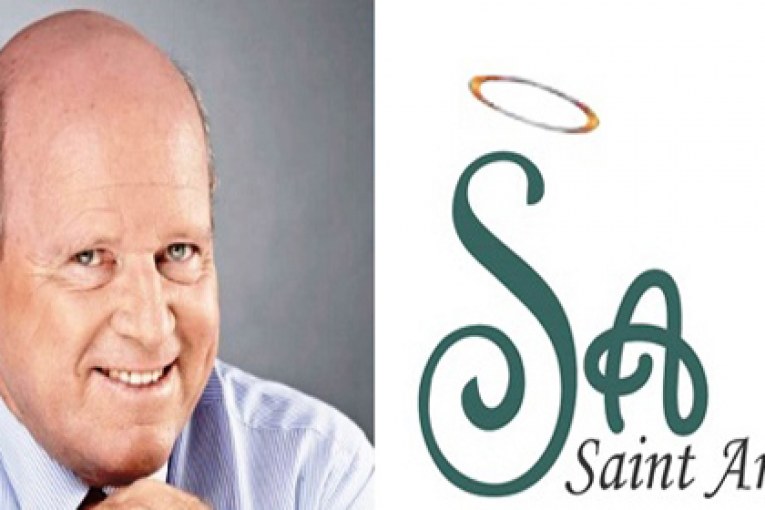
For more Saint Ange Tourism Report News – 12th Edition
Denis Private Island – a quarter of a century on
Martin and Carol Bibby returned to the white sandy shores of Denis Private Island recently after 25 years of being away. What has changed over the past 25 years? Everything. Or nothing at all. It simply depends on your perspective, and this honeymoon couple has the photographic evidence.
For Martin, who was planning a surprise honeymoon for Carol at the turn of the ‘90s, Seychelles was already a familiar name, due to his father’s travels in connection with the islands’ colonial administration in the late 1950s. “I wanted to go somewhere really remote,” Martin says. He was considering the Maldives in addition to Seychelles, but ultimately decided on Denis Island, and the rustic island experience was everything they imagined.
Probably the most interesting constant for Martin and Carol Bibby on their return to Denis Island, 25 years after their honeymoon, was Toby the tortoise. Following the honeymoon, however, they set about raising a family – with four children no less – so getting back to Denis had not been possible until earlier this year.
Whereas Toby the tortoise hasn’t changed much in 25 years, there are several aspects of Denis, and Seychelles in general, that have changed immensely, as the couple noticed.
“The rooms are enormously different – they were very basic and rustic shacks albeit lovely for what we wanted – remote and adventurous. Now the rooms are much larger and more luxurious. The bathrooms are so lovely now…hot and cold water!”
“The food was very good back then but there was not a huge amount of choice. Now the food is amazing. And we weren’t treated to a wonderful, romantic meal on the beach as we were this time.”
“There appear to be more staff now, and we were very aware of them all – in a good way. So helpful and friendly and always with a smile and wishing you good/morning/afternoon/evening .”
“The facilities have certainly improved by just the right amount, without spoiling it. As before there is no TV or internet in the room, which is fantastic! The bikes in particular have changed the experience as we could now explore the whole island much more easily.”
The couple also commended the island’s strong approach towards conservation and sustainability, noting that this had been lacking 25 years prior.
The other main constant, aside from Toby? Their principle activity, which was to relax. “Reading or walking with nothing to worry about but admiring the beautiful island and empty beaches!” Martin says.
One other thing is certain: it’s not going to take another 25 years for Martin and Carol to return. “Denis is a very special place to us, and holds many happy memories,” Martin says. “Now that our children are all grown up, we hope to return as soon as it is viably possible.”
An Untapped Tourism Niche Market
The Seychelles is currently missing out on enormous revenue that can be obtained by globally established casinos. These casinos may bring in hoards of rich gamblers to our shores by providing flights, transport, accommodation in world-class resorts, and entertainment such as boat trips and island visits. Furthermore, these high rollers would spend large amounts of money on shopping and dining during their stay, further adding economic benefit. Also, as the saying goes ‘the odds are always in favour of the casino’. Not to discourage gambling, but statistics show that there is a greater chance of the money staying with the house, rather than leaving the house. With ‘the house’ being Seychelles in this instance, further economic benefit is established.
Countries like Macau and Monaco are known for their luxurious casinos, and almost exclusively economically built through the courting of high roller gamblers, also known as junket players. Junket players originated in the US many years ago in a ploy to build up the now famous city of Las Vegas. Casino operators in Las Vegas would hire ‘junketeers’ to fill a plane with qualified gamblers. These players would be treated to free airfares, hotel accommodations, meals and free shows in exchange for their commitment to gamble a specific number of hours per day at an explicit average bet size. The casinos assumed that the players would lose than what was invested to bring them to the tables, and most of the time they were right. Sooner or later, the junket player concept had become a global enterprise.
These players have expressed that they would love to be brought to the Seychelles to gamble and at the same time to enjoy the exotic tropical delights of our country, a combination they can rarely find elsewhere. Unfortunately current legislation prohibits local casinos from inviting them.
There is of course understandable concern about the possibility of money laundering with junket players and the lack of control if the financial transactions take place outside the Seychelles. In this context, it is very important to note that if these players are brought to Seychelles that authorities will need to regulate all the player cash transactions for a junket, and that these transactions only take place in the casino based in Seychelles. Legislation about junkets and their control also needs to be put in place beforehand.
The Seychelles tourism industry is presently missing a huge opportunity in bringing these high roller players to our country. We already have in place the excellent infrastructure with the hotels and resorts where any of these players would feel at home.
Embracing Culture through Music
Keven Valentin is a patriotic Seychellois who remains at the forefront of the Creole music industry.
He started his music and dance careers in 1982 as a member of the National Troupe of Seychelles where the foundation for his artistic future was laid. In 1989, he joined the group Bwa Gayak as a choreographer, dancer and percussionist. There he acquired invaluable international experience, which ultimately led to his decision to form his own group, Sokwe.
SADC Summit approves Comoros as new Member
The 37th Southern African Development Community-SADC Ordinary Summit of Heads of State and Government have welcomed the Union of Comoros as a new member of SADC.The inclusion of the Union now brings the number of member states of the region to 16.
The Comoros is a sovereign archipelago island nation located between North-Eastern Mozambique and North-Western Madagascar in the Indian Ocean. Its capital is Moroni, on Grande Comore.
At 1,660 km2 (640 sq mi), the Comoros is the third-smallest African nation by area with a population of approximately 798,000 people. As a nation formed at a crossroads of different civilisations, the archipelago is noted for its diverse culture and history. It first inhabited by Bantu speakers who came from East Africa, supplemented by Arab and Austronesian immigration. The archipelago later became part of the French colonial empire in the 19th century before establishing independence in 1975.
The Comoros are also a member state of the African Union, Francophonie, Organisation of Islamic Cooperation, Arab League (of which it is the southernmost state, being the only member state of the Arab League with a tropical climate and also entirely within the Southern Hemisphere), the Indian Ocean Commission and the Indian Ocean Vanilla Islands.
Mega project for Mauritius and the relationship between Mauritius & China
A Chinese proverb says: An angry man should never open a shop, Mauritian-Chinese relation is on the Top, we will give you Virgin land, a big hand, be a good band, let’s beautify Mauritius Island
This is a Second chance for Mauritius’ Jin Fei economic zone: Almost given up for the dead, interest in the Jin Fei economic zone has been revived once again with a delegation of Chinese entrepreneurs visiting the island economy to explore investment opportunities in the ill-fated project. Hotels, offices, and a light engineering factory were planned to be built on the huge parcel of land outlined for the economic zone, as these assets are considered most productive and have the maximum employment generation potential.
Jin Fei Smart City is the name of this new project. Construction works are in good progress on the Jin Fei site at Riche Terre. After much dilly-dallying, the Jin Fei zone is now coming to life with a Smart City. Luxury residences, a university, international conference centres, hotels as well as cultural centres, the first building of the project, the Eden Square, is set to be ready in 2018. Costing nearly Mauritian Rs 1 billion, this iconic building will transform the Riche Terre landscape, as a prelude of more buildings to come.
Coratulations to Farzana Dhanji
Farzana Dhanji, has been a supporter of the Saint Ange Tourism Report from its first edition. She is the founder of Aryan Tours of the Americas and has a love and passion for Africa. This passion has led her to start Aryan Tours a company that sells safaris to many of the African countries.
Born and raised in Kenya, Farzana moved to Canada to work in the tourism and IT industry. Her passion for Africa has given her a purpose to shine the spotlight on this beautiful continent that only receives 5% of world tourism. A continent that has 54 countries full of culture, food, Eco systems and diversity. To help fulfil that purpose, Farzana started #Africatravelchat on many social media platforms which has resulted in tremendous success with viewership.
Farzana’s efforts have attracted the attention of several key players in the tourism industry and earned her the respect of her peers. Farzana has been recognized with the MKTE Tweeter Warrior award, KILIFAIR Blogger’s award and this year, she will be receiving the Africa 100 women in Travel awards for Media.



